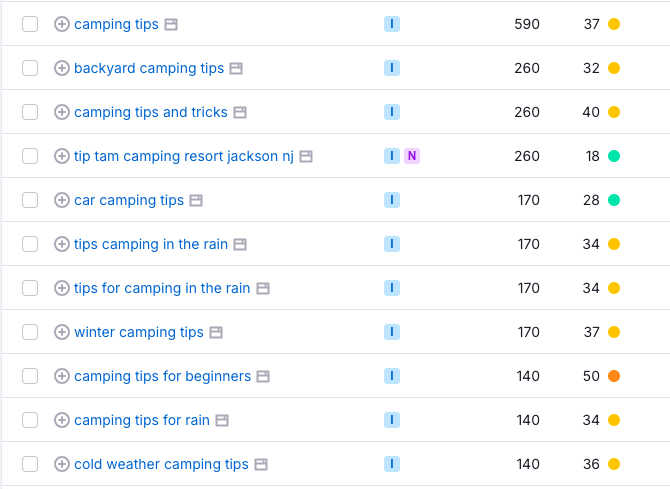What Is Keyword Cannibalization?
Keyword cannibalization occurs when multiple pages on the same website compete for the same search engine keyword. Instead of boosting your site’s visibility, it creates confusion for search engines about which page to prioritize, leading to diluted rankings and a weaker online presence. For example, if two blog posts target the keyword “best camping tips,” search engines might split their authority and traffic, causing neither to rank effectively.
Understanding and addressing keyword cannibalization is vital for creating a cohesive and effective SEO strategy. Identifying keyword cannibalization is crucial, as it helps uncover issues that can hinder organic traffic and overall site performance. This underpins the importance of regular site audits and thought-through target keywords to ensure your content production isn’t working against itself.

How Does Keyword Cannibalization Happen on Multiple Pages?
Keyword cannibalization often arises from an overly ambitious or poorly planned content strategy. Here’s how it typically occurs:
- Unclear Content Goals: When content creators don’t align topics with distinct purposes and search intent, multiple pages inadvertently target the same keyword, leading to a misconfiguration of search queries.
- Unoptimized Site Structure: Blogs, product pages, or service pages with overlapping content can unintentionally compete.
- Poor Coordination: Inconsistent collaboration between SEO teams and content specialists can result in repeated production of targeted keywords.
- Lack of Broad Keyword Targeting: Aiming for keywords without long-tail variations can cause overlap among different pieces of content.
Even seasoned marketers fall into this trap, especially when scaling content efforts without a keyword map or comprehensive strategy. The best way to fix keyword cannibalization is to be cognizant of it from the beginning — and throughout the lifespan of content cycles.
Common Reasons Keyword Cannibalization Occurs

- Multiple Blog Posts on Similar Topics
Sites often publish similar blog posts with slight variations, like “Top 10 Camping Tips” and “Best Camping Advice.” - E-commerce Product Pages
E-commerce sites with multiple products in the same category may use identical keywords across product pages (e.g., “men’s running shoes”). - Overuse of Generic Keywords
Targeting broad keywords like “SEO tips” across blogs, guides, and case studies leads to internal competition and leading search engines like Google and Bing to see pages with the same search intent. - Unintentional Tag and Category Confusion
Blog tags and categories, if mismanaged, may rank for the same keywords as the main content. - Duplicate Content Across Locations
Businesses with location-specific landing pages sometimes use the same keywords across all pages, such as “best pizza in [city].” This often results in duplicate pages or similar pages that can’t be differentiated by search engines.

Identifying and Diagnosing Keyword Cannibalization
Identifying and diagnosing keyword cannibalization is crucial for maintaining a healthy SEO strategy. Here are some steps to help you find keyword cannibalization solutions:

- Conduct a Content Audit: Start by reviewing your website’s content to identify pages that target the same or similar keywords. This will help you spot any overlaps that might be causing keyword cannibalization. Using a log analyzer tool or creating your own library in Google Sheets is a positive organizational way to tackle this analysis.
- Analyze Search Engine Rankings: Utilize tools like Google Search Console or SEMrush to analyze your website’s search engine rankings. Look for multiple pages that are competing for the same keywords and assess their performance.
- Check for Duplicate Content: Duplicate or similar content can lead to keyword cannibalization. Identify and address any pages with overlapping content to ensure each page has a unique focus and search intent.
- Review Internal Linking: Examine your website’s internal linking structure. Ensure that internal links are guiding search engines and users to the most relevant pages without causing competition among similar content. When you optimize links, you not only help Google and Bing assess your content purpose, but also improve the UX and consumer journey.
- Check for Keyword Overlap: Use tools like SEMrush or Ahrefs to identify keywords that are being targeted by multiple pages on your website. This will help you refine your keyword strategy and avoid internal competition. When pages rank for the same keyword, content refreshes can fix keyword cannibalization issues by moving specific pages off a target keyword and onto a better keyphrase that matches the desired intent of the content query.
Why Keyword Cannibalization Is Harmful
1. Diluted Rankings and Traffic
When multiple pages target the same keyword, search engines divide their authority and relevance across these pages in the search results. This weakens their ability to rank highly, reducing overall traffic. A study by Ahrefs found that pages competing for the same keyword rank lower on average compared to well-structured pages.
2. Confused Search Engines
Search engines struggle to determine which page to show for a query, leading to erratic rankings or fluctuations in visibility.
3. Lost Link Equity
Internal and external backlinks might spread across competing pages instead of consolidating on one, weakening the potential ranking power.
4. Hindered User Experience
Users may land on pages with similar content and feel frustrated by redundancy or lack of thoroughness in solving their question , impacting site credibility and engagement metrics like bounce rates.
Steps to Avoid Keyword Cannibalization

1. Create a Keyword Map
Build a spreadsheet outlining which target keywords are assigned to specific pages. Regularly update this document as new content is published. During this phase, it is best to add more detail to your maps. This includes listing any keywords that will be used under the main target keyword, the search intent of the user, recommended content length, content synopsis/objective, a content outline, included internal links, and more.
2. Use Unique, Long-Tail Keywords
Target long-tail variations of your core keywords to ensure each page has a unique focus (e.g., “SEO tips for small businesses” vs. “technical SEO best practices”).
3. Audit Your Content Regularly
Schedule periodic content audits to check for overlapping keywords. Use tools like Ahrefs, SEMrush, or Google Search Console to identify pages ranking for the same terms. A regular 3-month check of content is recommended to allow enough time for SEO to take effect, but also readjust copy before cannibalization can fully impact page results.
4. Optimize Internal Linking
Guide search engines and users to the most authoritative page for a keyword by strategically linking related content back to it. Having an internal linking strategy to pair with your content development is a critical piece to the puzzle in achieving positive organic performance.
Steps to Fix Keyword Cannibalization
If keyword cannibalization has already occurred, follow these steps to address it: fixing keyword cannibalization involves identifying a primary page for each targeted keyword and ensuring Google recognizes this choice for optimal ranking. Various solutions include redirects, canonical tags, content optimization, and no index tags, each suited for different scenarios.

1. Consolidate Content
Merge competing content into a single, comprehensive piece. Redirect the weaker pages to the consolidated page to preserve link equity.
2. Use Canonical Tags
For ecommerce or category pages, add canonical tags to signal the preferred page for search engines to rank.
3. Retarget Keywords
Adjust the focus of secondary pages to target unique, long-tail variations or related keywords that complement the primary target keyword.
4. Optimize Metadata
Ensure each page has unique meta titles and descriptions that reflect their distinct keyword targets.
5. Leverage 301 Redirects
If two pages serve similar purposes, redirect the lower-performing one to the higher-performing page to consolidate authority and traffic.
The Negative Results of Keyword Cannibalization (With Stats)
The consequences of keyword cannibalization extend beyond rankings, impacting your website’s visibility, engagement, and overall performance. Here are some key insights supported by statistics:

- Reduced CTR (Click-Through Rate):
Pages competing for the same keyword divide their ranking power, resulting in lower click-through rates. A study by Search Engine Journal found that having a single high-ranking page for a keyword improves CTR by 17% compared to multiple competing pages ranking lower on the same SERP. - Diluted Traffic:
Keyword cannibalization can result in a 30-40% drop in traffic to individual pages due to split authority, as reported by Moz. Instead of consolidating rankings and traffic, cannibalization spreads visibility thin across competing pages. - Missed Ranking Opportunities:
Ahrefs revealed that 66.31% of pages have zero backlinks, meaning that keyword cannibalization further weakens their chances of ranking by distributing the few available backlinks across multiple URLs. Consolidation could channel link equity into a single, stronger page. - Inconsistent SERP Rankings:
Cannibalized pages often experience ranking fluctuations, which can negatively impact traffic stability. Research from SEMrush highlights that inconsistent rankings can result in up to 45% of monthly traffic loss for competitive keywords. - Lower Conversion Rates:
When multiple pages with similar content split traffic, the user journey becomes fragmented. HubSpot found that consolidated pages with clear calls-to-action (CTAs) had 93% higher conversion rates compared to multiple disjointed pages targeting the same topic. - Wasted Resources:
Keyword cannibalization often stems from redundant content creation. According to Content Marketing Institute, nearly 60% of marketers admit to creating repetitive content without realizing it, costing time and effort that could be allocated to unique, high-impact pieces. - Weakened Domain Authority:
Competing pages dilute domain authority for the targeted keyword. A BrightEdge report shows that websites optimizing for clear, segmented keywords achieve 3.5x better performance in domain authority growth over those with overlapping keywords. - Impact on ROI:
For businesses relying on organic search as a primary channel, keyword cannibalization can significantly lower the return on investment. Companies with structured content strategies saw 2.5x more traffic and leads compared to those with overlapping keywords, as per HubSpot data.
Best Practices for Keyword Research and Planning
Effective keyword research and planning are essential to avoid keyword cannibalization and improve your search engine rankings. Here are some best practices to follow:
- Conduct Thorough Keyword Research: Use keyword research platforms to perform comprehensive keyword research. Identify relevant keywords that align with your content goals and target audience. Take into account keyword volume and difficulty, relevant to your site’s domain authority.
- Create a Keyword Strategy: Develop a keyword strategy that outlines which keywords to target on each page. This will help you avoid overlapping keywords and ensure each page has a unique focus. In your strategy, ensure that you are working to build topical authority on the subject(s) to help signal to search engines you are a credible and trustworthy source. This translates to producing multiple pieces of content that answer different related questions and sought-after information on the topic.
- Build a Content Journey Map: A content journey map is a visual representation of what content pieces you will create, who they are intended to target, how users will move from piece to piece, and what end goals are attached to each content page. This process helps simplify what goals are attached to each piece of written content, how they need to be produced, and identify keyword cannibalization before the content is live.
- Use Long-Tail Keywords: Long-tail keywords are less competitive and can help you avoid keyword cannibalization. They also tend to attract more targeted traffic, improving your chances of conversion.
- Use Keyword Clustering: Group related keywords together to create a cohesive content strategy. This approach helps you cover a topic comprehensively without causing internal competition.
- Regularly Review and Update Your Keyword Strategy: SEO is an ongoing process. Regularly review and update your keyword strategy to ensure it remains aligned with your website’s content and search engine rankings. Your website’s organic search performance changes with algorithm updates and how engines grade content. Therefore, having a consistent audit process is paramount.
Tools to Identify and Manage Keyword Cannibalization
Several tools can help identify and prevent keyword cannibalization, including:
- Google Search Console: View which queries multiple pages are ranking for.
- Ahrefs/SEMrush: Analyze competing pages for shared keywords and track rankings.
- Screaming Frog: Audit site structure and metadata for duplication.
- Google Analytics: Discover how users are interacting and behaving with each content page.
Conclusion: How to Fix Keyword Cannibalization
Keyword cannibalization is a silent threat to your SEO strategy that can harm rankings, confuse users, and dilute your site’s authority. By understanding how it occurs, actively avoiding it, and implementing solutions when it arises, you can ensure your website’s content works cohesively to maximize its SEO potential.
Discovering the root of this problem can be tricky, as sometimes it is hard to notice if you don’t know what you’re looking for. Contact Markitors for a free consultation on your SEO performance and keyword cannibalization status. Let’s fix your ranking issues.







